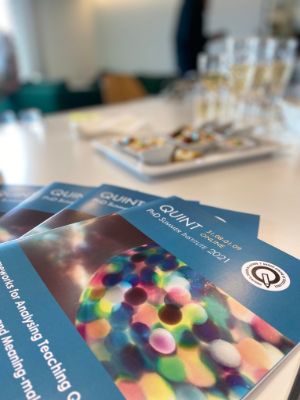There was high international participation in QUINT's online PhD Summer Institute for 2021.

The QUINT PhD Summer Institute for 2021 was held online over two days from the 31st of August to the 1st of September. PhD students and researchers gathered for presentations and discussion around the theme of ‘Frameworks for Analysing Teaching Quality: Methods, Measures and Meaning-making.’ The 2021 Institute was the second in the series of the PhD summer schools organised by QUINT. The PhD Summer Institutes provides the opportunity for international doctoral students to explore and discuss the issues linked to analysing teaching quality. Following the success of 2019, the Institute in 2021 was attended by PhD students from Germany, Switzerland, USA, Cyprus, UK, Netherlands, France – as well as all five Nordic countries – who presented a combined total of 30 papers over 10 sessions.
The Summer Institute opened with keynote speakers Anna-Katharina Praetorius and Charalambos Y. Charalambous, who in a joint presentation emphasised the importance of collaboration in teaching quality analysis. The field is broad, but also fragmented, and Praetorious and Charalambous cited the example that there are now around 200 published observation manuals for assessing teaching quality.
“It’s really hard if we have different frameworks to then compare what is similar and different across countries.” – Praetorious
Praetorious and Charalambous encouraged the PhD students to think about how they can contribute to furthering the field of teaching quality analysis through their collaborative work.
“Collaboration is not the magic spell that is going to solve all the problems in the field, but it can help us understand where we are right now, what has been produced, what are the open issues and how to work towards identifying some solutions” – Charalambous.
Praetorious and Charalambous presented their work with other teaching quality scholars where they looked at finding ways of working more collaboratively in the field.
Thorough this work they identified five challenges that hinder collaborative work:
- Establishing common goals and agendas
- Resolving differences in terminology and structure
- Addressing operationalisation and measurement challenges
- Dealing with insufficient transparency and the need for sharing in formation
- Attending to issues of limited funding
QUINT centre director Professor Kirsti Klette presented her argument for standardised observation manuals as a tool for, among other things, decreasing the fragmentation in the field of teaching quality research, and facilitating more collaboration.
“Common tools for research developed within an integrated methodological design could help researchers make progress in aggregating knowledge about the impact of different reaching approaches across settings and subject areas” said Klette.
 In his keynote, Postdoctoral Fellow Mark White discussed the issue of rater error in classroom observation from the perspective of ‘institutionalised rituals.’ White argued that practices such as double rater scoring for classroom observation do not necessarily produce the kind of robust conclusions they are assumed to, and made the case for moving towards methods that look more directly at the potential validity threats to observation studies.
In his keynote, Postdoctoral Fellow Mark White discussed the issue of rater error in classroom observation from the perspective of ‘institutionalised rituals.’ White argued that practices such as double rater scoring for classroom observation do not necessarily produce the kind of robust conclusions they are assumed to, and made the case for moving towards methods that look more directly at the potential validity threats to observation studies.
You can watch full videos of all three keynote presentations on the keynote section of the PhD Summer Institute event page.
The participating PhD candidates presented papers on a variety of topics raging from classroom digitalization, to methodology, to students’ engagement with multi-modal texts. A complete program with links to the papers presented is available on the PhD Summer Institute 2021 event page.
Despite the necessity of holding the Summer Institute online the response from the PhD students was overwhelmingly positive.
"My experience at the PhD summer institute was perfect. Meeting colleagues from the same field allowed for rich discussion, networking opportunities and possible future collaboration, and presentations that were engaging to watch and relatively easy to discuss afterwards. I would definitely like to attend the institute in 2022." – Bas Senden, University of Oslo
"For me, this was the first time I was able to discuss subject specific issues in the context of classroom observations. Broader collaboration provides opportunities for discussion of both general and more specific questions." – Jenni Ruotsalainen, University of Jyväskylä
“I experienced the QUINT PhD Summer Institute 2021 as an encouraging event covering many interesting and diverse topics with some lively discussions. The conference gave me a lot to think about - both in general when it comes to conducting research in teaching quality, as well as my own research topic and presentation.” –Jenny Högström
The QUINT conference – normally an open event – was run internally in 2021 in the days directly following the PhD Summer institute (2-3 of September). The conference was structured around the four themes of the QUINT centre and the projects connected to them. Practical and methodological questions relating to the QUISST, QUiCC, QUALE and LISA Nordic studies were discussed in detail amongst the researchers and project leaders, who exchanged thoughts and feedback about the ongoing research.
The next QUINT PhD Summer Institute and Conference will be held in Reykjavik, Iceland in week 23 of 2022. For updates sign up for the QUINT newsletter or follow us on social media.